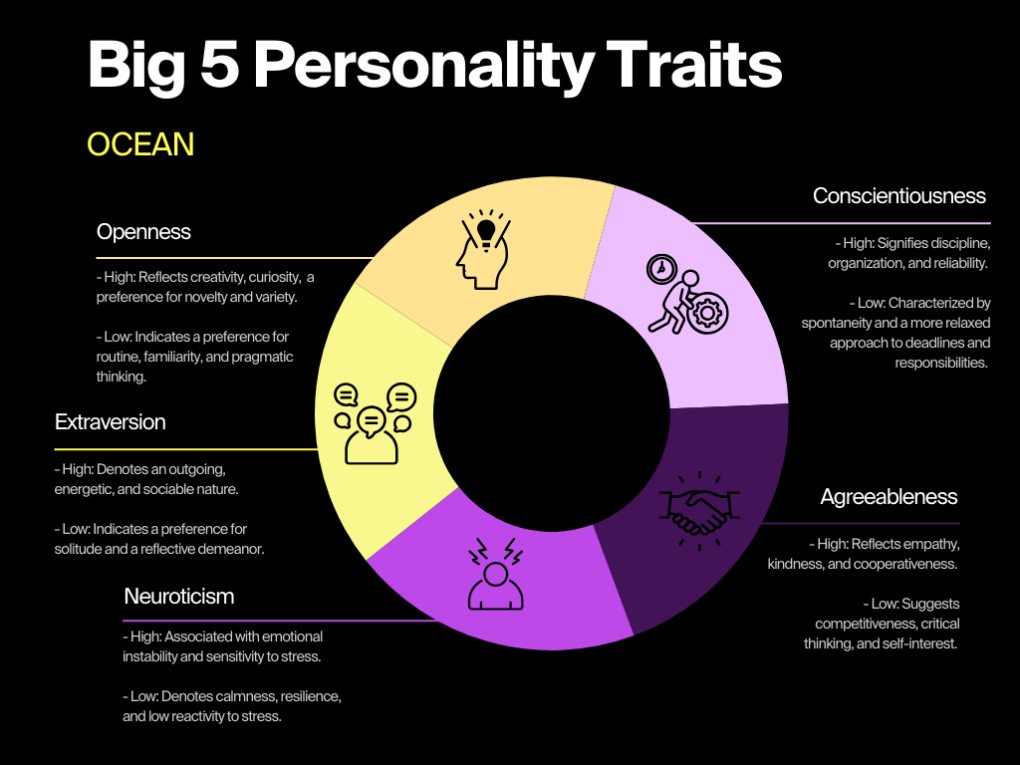
June 26, 2024
Personality Traits of Successful Entrepreneurs
We’re still absorbing our learnings from the Tech Open Air talks. While AI was the clear protagonist of this year’s conference, we were also allured by Florian Huber’s masterclass “Personality Traits of Successful Entrepreneurs”.
Florian Huber is Co-Founder and Chief Investment Officer at EWOR, a serial entrepreneur and seasoned investor in over 50 tech startups.
We entered the room thinking: Is there a correlation between personality traits and entrepreneurial success?

While traits like high intelligence, industry experience, hard work ethic or leadership abilities are often seen as staples of entrepreneurial success, Huber delved deeper, leveraging personality psychology to uncover additional factors.
The Big Five Personality Traits
Central to Huber’s analysis is the Big Five personality traits model. Commonly referred to as OCEAN, it’s a grouping of five unique characteristics used to study personality.
→ Openness
→ Conscientiousness
→ Extraversion
→ Agreeableness
→ Neuroticism
Here’s a closer look at these traits:

Now, how do these rank on the scale of entrepreneurial success? Huber emphasized the following correlations:
Openness: High levels are beneficial.
Conscientiousness: High levels are beneficial.
Extraversion: Surprisingly, this trait does not significantly impact success.
Agreeableness: Low levels are preferable.
Neuroticism: Low levels are advantageous.
Beyond the Big Five: Additional Success Predictors
But as complex as humans are, Huber also identified several other traits that help optimize for the probability of founder success:
→ High Responsiveness: The ability to swiftly reply in communications and exchanges with investors. So that e-mail you’ve been putting off for tomorrow? Try to get back to it today.
→ Talent Magnets: Startups have few resources to offer when getting started. So the knack for attracting and retaining top talent is a very sought-after skill.
→ Obsessiveness: A deep, almost obsessive focus on the startup project and business goals is another of the traits Huber saw being prevalent in upfront entrepreneurs.
→ No Work-Life Balance: This one is controversial, but an intense dedication to work over personal life, at least during the first years, is also a common denominator of success.
→ Ruthlessness: The capacity to make tough decisions unemotionally.
→ Not a Well-Rounded Personality: While most investors tend to favor individuals with a balanced and diverse set of skills, there is also a place for outliers. Specialization and depth in one area can be more advantageous than a broad skill set.
Practical Insights for Aspiring Entrepreneurs
Huber also offered practical advice based on his extensive experience:
→ Founding Teams vs. Solo Founders: Teams tend to outperform solo founders due to a diversity of skills and shared responsibilities.
→Training Traits: Wish you had less social anxiety? The good news is personality traits are actually moldable to some extent.
“Among the Big Five, agreeableness is the easiest trait to train, while openness is the hardest. ”
Summary
Florian Huber’s insights provided a nuanced understanding of what it takes to succeed as an entrepreneur. Beyond intelligence and hard work, traits like high responsiveness, the ability to attract talent, and a focused, determined nature can play critical roles.
Huber’s talk underscored that while traditional traits are important, a deeper understanding of personality and behavior can significantly enhance one’s entrepreneurial journey.
By integrating these insights, aspiring entrepreneurs can better prepare themselves for the challenges and opportunities that lie ahead.

